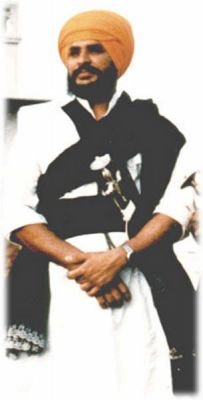Non-Sikhs on Sikhism
Some thoughts of modem writers on Sikhism and Gurbani.
Rev. H. L. Bradshaw
After thoroughly studying the philosophy of Sikhism, Rev. H. L. Bradshaw observed:
Sikhism is a Universal world Faith, a message for all men. This is amply illustrated in the writings of the Gurus. Sikhs must cease to think of their faith as just another good religion and must begin to think in terms of Sikhism being the religion for this New Age … It completely supplants and fulfils all the former dispensations of older religions. Books must be written proving this. The other religions contain the truth, but Sikhism contains the fullness of truth.
Bradshaw also writes:
The Guru Granth Sahib of all the world religious scriptures, alone states that there are innumerable worlds and universes other than our own. The previous scriptures were all concerned only with this world and its spiritual counterpart. To imply that they spoke of other worlds, as does the Guru Granth Sahib, is to stretch their obvious meanings out of context. The Sikh religion is truly the answer to the problems of the modern man.
Archer
Archer, in his book on the Sikh faith comments:
The religion of the Guru Granth is a universal and practical religion … Due to ancient prejudices of the Sikhs it could not spread in the world. The world needs today its message of peace and love.
Dorothy Field
Another scholar, Dorothy Field in her book, "The Sikh Religion," writes:
Pure Sikhism is far above dependence on Hindu rituals and is capable of a distinct position as a world religion so long as Sikhs maintain their distinctiveness. The religion is also one which should appeal to the occidental mind. It is essentially a practical religion. If judged from the pragmatical standpoint which is a favorite point of view in some quarters, IT WOULD RANK ALMOST FIRST IN THE WORLD. (Emphasis by the author). Of no other religion can it be said that it has made a nation in so short a time.
Macauliffe
In his book, "The Sikh Religion," Macauliffe writes:
Unlike the scriptures of other creeds, they do not contain love stories or accounts of wars waged for selfish considerations. They contain sublime truths, the study of which cannot but elevate the reader spiritually, morally, and socially. There is not the least tinge of sectarianism in them. They teach the highest and purest principle that serve to bind man to man and inspire the believer with an ambition to serve his fellow men, to sacrifice all and die for their sake.
Macauliffe deems it necessary to draw the reader's attention to another significant feature of Sikhism which distinguishes it and separates it from other philosophical and religious systems of thought:
The Sikh religion differs as regards the authenticity of its dogmas from most other great theological systems. Many of the great teachers the world has known, have not left a line of their own composition, and we only know what they taught through tradition or second-hand information. If Pythagoras wrote any of tenets, his writings have not descended to us. We know the teachings of Socrates only through the writings of Plato and Xenophon. Buddha has left no written memorials of his teaching. Kungfu-tze, known to Europeans as Confucious, left no documents in which he detailed the principles of his moral and social systems. The Founder of Christianity did not reduce his doctrines to writing, and for them we are obliged to trust to the Gospels according to Matthew, Mark. Luke, and John.
The Arabian Prophet did not himself reduce to writing the chapters of the Quran. They were written or compiled by his adherents and followers. But the compositions of the Sikh Gurus are preserved and we know first hand what they taught. They employed the vehicle of verse, which is generally unalterable by copyist, and we even become in time familiar with their different styles. No spurious compositions or extraneous dogmas, can therefore be represented as theirs.
The author of the 'Vie de Jesus' was a great admirer of Jesus Christ. Greatly impressed as he was of the spiritual message delivered by Christ and those of the Semitic thinkers that preceded him, he posed the question: "Whether great originality will again arise or the world be content to follow the paths opened by the daring creators of the ancient ages?" Bearing Sikhism in mind, Macauliffe answers the above question in the following words:
Now there is here presented a religion totally unaffected by Semitic or Christian influences. Based on the concept of the unity of God, it rejected Hindu formalities and adopted an independent ethical system, ritual, and standards, which were totally opposed to the theological beliefs of Guru Nanak's age and country. As we shall see hereafter, it would be difficult to point to a religion of greater originality or to a more comprehensive ethical system
Macauliffe continues:
Guru Nanak was not a priest either by birth or education, but a man who soared to the loftiest heights of divine emotionalism, and exalted his mental vision to an ethical ideal beyond the concept of Hinduism or Mohammadanism.
Dr. W.O. Cole
Dr. W.O. Cole, of the U.K. wrote more than half a dozen books on Sikhism. In 1985, he visited India where communal disturbances had created a virtual turmoil and thousands of people were killed. In a key note lecture by him on the Mission and Message of Guru Nanak Dev, he gave a message to the Sangat there and through them to all of humanity:
Remember the tenets of Guru Nanak, his concepts of oneness of God and Universal Brotherhood of man. If any community holds the key to national integration of India, it is the Sikhs all the way.
After the lecture, he was asked what drew him to the study of Sikhism, he replied:
Theologically, I cannot answer the question what drew me to the study of Sikhism. You may call it, the purpose of God. But to be more specific, the unique concept of universality and the system of Langar (free community meal) in Sikhism are the two features that attract me towards the study of Sikhism. Langar is the exclusive feature of Sikhism and found nowhere else in the world. Sikhism is the only religion which welcomes each and everyone to its Langar without any discrimination of caste, creed, color, or sex.
Swami Nitya Nand
The opinions of some Hindu mystics also should be quoted to understand their experiences with the Sikh faith. Swami Nitya Nand (expired at the age of 135 years) writes in his book "Gur Gian":
I, in the company of my guru, Brahma Nand Ji, went to Mathra ... While on pilgrimage tour, we reached Panjab and there we met Swami Satya Nand Udasi. He explained the philosophy and religious practices of Nanak in such a way that Swami Brahma Nand Ji enjoyed a mystic lore. During the visit to the Harimandar Sahib, Amritsar, his soul was so much affected, that he became a devotee of the Guru. After spending some time in Panjab he went to Hardwar. Though he was hail and hearty, one day I saw tears in his eyes. I asked the reason for that. He replied, "I sifted sand the whole of my life. The Truth was in the House of Nanak. I will have to take one more birth in that house, only then I will attain Kalyan." After saying that the soul left his body.
Swami Nitya Nand also wrote of his own experience:
I also constantly meditate on Waheguru revealed by Nanak. I practiced Yoga Asanas under the guidance of Yogis and did that for many years; the bliss and peace, which I enjoy now, was never obtained earlier.
Spiritual Triage
Finally, here are some excerpts from the proceedings of a seminar on the life of Guru Nanak Dev. It was conducted at Simla, now in Himachal Pardesh, by the Panjab Historical Society Lahore, before World War I. The seminar was presided over by the lieutenant governor of Panjab.
After hearing the lecture by Joginder Singh, Pundit Ramsaran Das, a prominent Hindu intellectual observed that Guru Nanak was a great reformer of the Hindu faith.
Nawab Zulfkar Ali Khan of Malerkotla disagreed with Mr. Das and commented that Guru Nanak was a great Muslim fakir, his best friend was Bhai Mardana, a lowly Muslim. His best devotee was a Muslim, Rai Bular, the village chief.
The governor, in his presidential remarks disagreed with both and said that according to what had been told by the speaker, Guru Nanak was a great Christian.
Guru Nanak, however, states in Gurbani:
"I am neither a Hindu nor a Muslim, I am a human being."
Vaheguru Ji Ka Khalsa Vaheguru Ji Ki Fateh









No comments:
Post a Comment